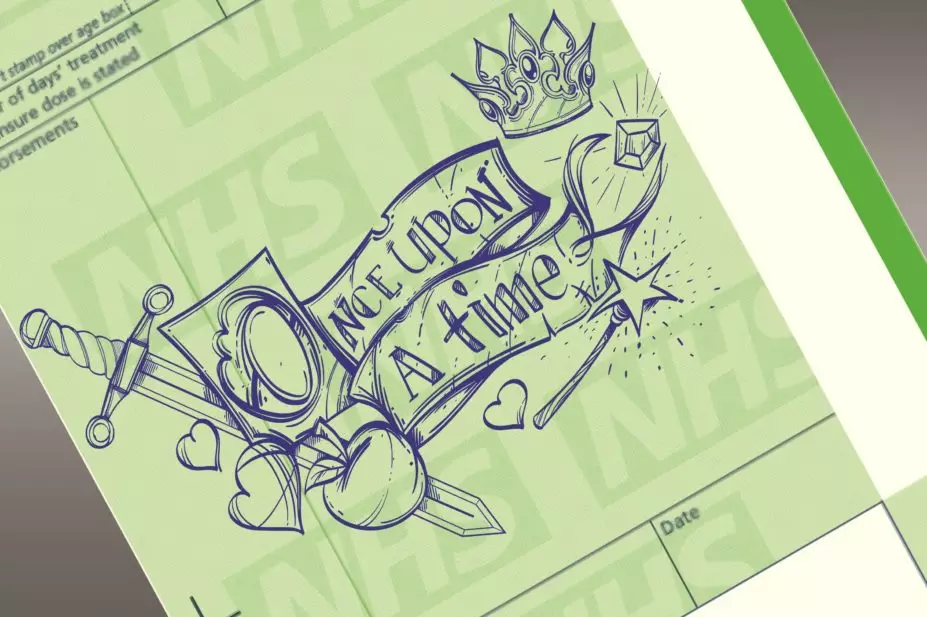
Mclean/Shutterstock.com
I am a mental health pharmacist and a storyteller — a ‘dispenser’ of stories, if you will.
I started my story as a student at the International School of Storytelling, based at Emerson College, East Sussex, where, in October 2018, I spoke about my work as a pharmacist in mental health. This prompted my teacher to put me in touch with another healthcare professional — a forensic nurse — who had studied at the same insititution a decade earlier.
Over a telephone conversation, Jess Wilson — now a hospital director — told me that she had found that telling stories reduced challenging behaviour in her patients and had reduced the amount of rapid tranquilisation administered.
Her advice was to just tell a story. “Trust the story; let the story do the work,” she said. “A little miracle happens when you tell a story.”
Not long after our conversation, I was talking with a patient and we had ten minutes left before the end of our appointment. I took a deep breath and asked her if she wanted to hear a story. She did and, with trepidation, I began: “Once upon a time, in the depths of winter, there lived a little girl in a small wooden hut. The little girl was very sick and nothing her parents did could make her better.”
When I had finished telling my ‘healing story’, something wonderful happened. The person I had been talking to for the past 40 minutes — who was oversedated owing to polypharmacy, the reason I had met with her in the first place — smiled for the first time in that appointment. I saw life in her eyes. “What a lovely story,” she said. “I will think about what it means on the bus on my way home.”
With each telling, my stories take a life of their own and bring new elements of wisdom to me and to my listeners
“Wow, I’ll try that again,” I thought. I now begin every medication group session for service users with a story.
It can be difficult to talk about psychiatric medication with some patients; discussing it can bring back past trauma. Some people have a lot of anger; others need hope. When I enter the room for the session, the communal anxiety and fear of talking about medication is palpable. Then, unexpectedly, I begin with “Once upon a time”.
I hear their sighs of relief. Their tensed limbs relax as they sink comfortably into their chairs. People smile, and they look into the distance to imagine far-away worlds filled with animals, kingdoms, journeys, and heroes and heroines overcoming challenges and coming back stronger.
The stories I tell all have themes of healing, hope or overcoming adversity. With each telling, my stories take on a life of their own and bring new elements of wisdom to me and to my listeners. It is medicine in its own way.
I also bring my stories to the University of Brighton, where I lecture nursing students. Every pharmacology lecture begins with a story. Stories help people arrive, settle in, leave the outside world at the door and be present.
I start every teaching session at work with a story too. Colleagues do not expect to go into training to be greeted with “Once upon a time”. Once, during a medicines management day for nurses, the whole IT system collapsed. We had a whole day of teaching ahead of us and I was left with no projector, no slides, no laptop.
I felt naked — like the emperor with no clothes. However, I had already told the group of nurses a story by then. We were no longer complete strangers, or a trainer with her trainees; the dynamics had shifted and we were a community. People helped me: someone called IT, another person made me a cup of tea, and others offered the wisdom of my story back to me like a mirror. It was gladly received and it got me through the next few hours. I was not alone — we were in it together.
Stories are powerful. They bring us closer together, help us build trust and deliver wisdom, hope and healing. I cannot think of something more valuable to not just mental healthcare, but every part of our NHS.
Nana Tomova, lead pharmacist, mental health community teams, Sussex Partnership NHS Foundation Trust, and a visiting lecturer at the University of Brighton


